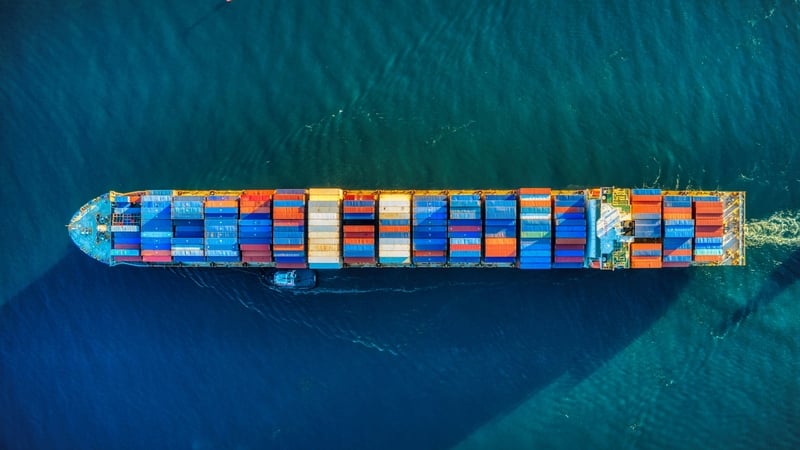Analysis: The International Maritime Organisation are discussing measures to decarbonise shipping, including the introduction of a carbon levy
This week marks a significant moment in the history of the shipping industry and global trade. After years of deliberation, the 176 member states of the International Maritime Organisation (IMO) – the United Nations agency that regulates international shipping – are close to reaching an agreement on new policies that could fully decarbonise the sector. What implications will this decision have for climate change, global trade and the shipping industry?
As the impacts of climate change are increasingly noticeable worldwide, this year has been particularly difficult for climate action, especially after Donald Trump’s re-election, which has hindered US climate policy and commitment to international cooperation.
Negotiations at the IMO offer a key opportunity for progress, as shipping contributes about 2 to 3% of global greenhouse gas emissions, more than Germany’s total and over 15 times that of Ireland. In 2023, the IMO set a historic goal for the shipping industry to reach net-zero emissions “by or around” 2050, but meaningful progress is unlikely without strong, legally binding policies to support this target.
We need your consent to load this YouTube contentWe use YouTube to manage extra content that can set cookies on your device and collect data about your activity. Please review their details and accept them to load the content.Manage Preferences
From What’s Going On With Shipping, maritime historian Sal Mercogliano discusses the impact on international shipping of Trump’s tariffs, the trade war and the UN’s International Maritime Organization carbon tax
The decision could be a vital step for climate finance. A World Bank report suggests that a pricing mechanism for shipping emissions, like a levy, could generate $40-60 billion annually until 2050. With the United States withdrawing significant amounts of climate finance, these funds could offer crucial support to climate-vulnerable countries.
International shipping is a crucial driver of global trade, accounting for over 80% of internationally traded goods by volume. In Ireland alone, ports handle more than 50 million tonnes of goods each year. It is very likely that what you had for breakfast this morning or you are holding in your hand at this moment travelled across the sea at some point in time.
Concerns about the trade implications of decarbonising shipping have often been at the forefront of discussions at the IMO, largely focused on the potential impact of a carbon pricing mechanism. Some countries, particularly in Latin America, worry that policies aimed at decarbonisation could lead to a decline in their exports. The impacts of these policies on trade and GDP are expected to be limited overall, but some developing states are likely to be impacted more than others. Modelling suggests that even a relatively strong levy may only have a small impact on the prices paid by consumers.
We need your consent to load this rte-player contentWe use rte-player to manage extra content that can set cookies on your device and collect data about your activity. Please review their details and accept them to load the content.Manage Preferences
From RTÉ Radio 1’s The Business in 2021, Adam Maguire reports on the changing nature of life in Dublin’s docklands
China and several other nations oppose the introduction of a levy and instead advocate a credit trading system that centered on delivering flexibility in compliance. Meanwhile, Ireland and other EU member states (acting collectively within the IMO) along with numerous Pacific and Caribbean countries, support a levy that emphasises emission reductions and revenue generation. Recently, there have been indications that the EU may be moving closer to the Chinese viewpoint, but it is still uncertain what the final compromise will entail.
Countries have worked intensely in the last few days to bridge the different proposals and develop a widely supported text. However, many of the key details remain contested. Having been part of the World Bank delegation to the IMO negotiations for many years, I am very familiar with the saying that “nothing is decided until everything is decided” at the IMO.
For millennia, ships primarily relied on human labor and wind for propulsion. However, this changed in the 19th century with the widespread adoption of fossil fuels. In the coming decades, we are likely to see a shift back to wind propulsion and a significant uptake of alternative fuels to replace oil and LNG. The decisions made this week will determine the pace of this transformation.
We need your consent to load this rte-player contentWe use rte-player to manage extra content that can set cookies on your device and collect data about your activity. Please review their details and accept them to load the content.Manage Preferences
From RTÉ Brainstorm, all you ever wanted to know about shipping containers
The energy transition in shipping presents significant opportunities for many countries to become suppliers of alternative fuels, such as ammonia and methanol. It also poses infrastructural challenges, as ports and bunkering facilities will need to be adapted to be compatible with new technologies.
For shipping companies and maritime workers, the energy transition brings new challenges related to the safe handling of alternative fuels and compliance with evolving regulations. Thanks to support from Irish Aid and the UN Foundation, along with assistance from the Department of Transport and the World Bank, I have organised and delivered training on shipping decarbonisation policies for over 200 delegates to the IMO from more than 65 developing countries since 2022 at DCU. However, as decarbonisation accelerates, much more work remains to be done in this area.
What happens if there’s no agreement?
If countries cannot reach a consensus on new global policies for decarbonising shipping, there are two possible scenarios: a decision could be made with a qualified majority vote, or the negotiations could end without an agreement. Without an agreement, we may see the emergence of sub-global climate action within this sector.
This could lead to higher compliance costs for shipping companies, leave many countries struggling to keep pace with the transition, and ultimately not deliver a “just and equitable transition” as agreed by the IMO. In a year marked by challenges to multilateral cooperation, the IMO has a unique opportunity to demonstrate the importance of global collaboration for the public good.
Follow the RTÉ Brainstorm WhatsApp channel for more stories and updates
The views expressed here are those of the author and do not represent or reflect the views of RTÉ




